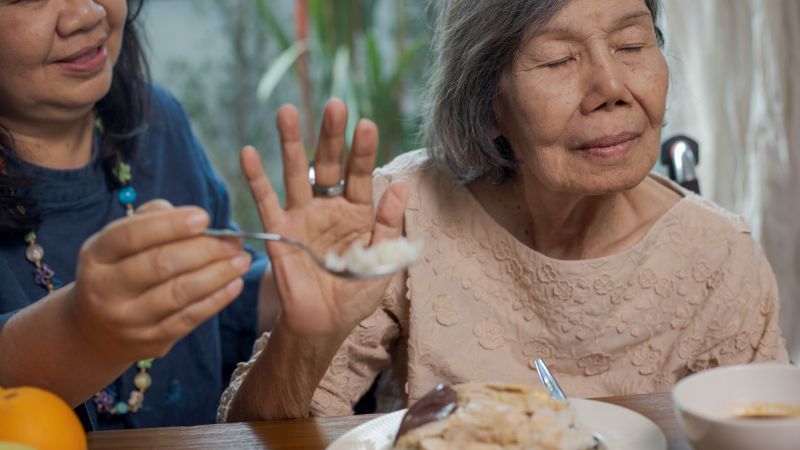
Aging affects appetite, causing many seniors to struggle to meet their daily nutritional needs. Eating balanced meals is a critical component to healthy living. Although older people may not find foods to be as enjoyable, caregivers can effectively stimulate their appetite.
Why do seniors lose appetite?
Gradually losing one’s appetite is normal with advancing age. Seniors’ energy levels are lower than when they were younger, making it less necessary to pile up the plate with hearty foods. Even active seniors do not rely so heavily on calorie consumption as in years prior.
Seniors are likely to have difficulty chewing or swallowing, both of which reduce their appetite. Chewing difficulties may be caused by a range of factors, such as dental issues, dry mouth or an infection. Wearing dentures can also make it uncomfortable to chew some foods.
Older people’s taste buds decline with age, making foods that are rich in taste and texture seem bland. A reduced sense of smell also impacts elderly individuals’ desire to eat. Gastrointestinal changes can cause eating and digesting to become uncomfortable.
Weakened by physical ailments or disease, seniors may no longer have the endurance to stand over a stove and cook. When they are no longer able to independently prepare meals, their appetite may suffer as well. Requiring assistance after a stroke can likewise cause a loss of appetite.
Side effects of medications can cause seniors to lose their appetite. Feelings of loneliness and depression can affect the eating habits of an older adult. The joy they once had in relishing a bowl of hot soup may no longer be present once depression or loneliness sets in.
Encouraging a senior who refuses to eat, however, can be accomplished. Stimulating appetite varies from person to person and the strategies to do so depend on the causes of the appetite loss. Caregivers can try these methods to stimulate the appetite in their elderly loved ones.
1. Visit the doctor or dentist
Firstly, determine if any medical conditions are causing the senior to lose his appetite. Consult the aging adult’s doctor if medication side effects produce nausea or suppress appetite. A medication adjustment may be necessary to return a healthy appetite to the senior.
Poorly fitting dentures should prompt a visit to the dentist, especially since they can hamper eating. At the dentist’s office, the senior can expect a thorough oral exam. The dentist will determine the stability of the dentures and examine the senior’s bite.
2. Establish a regular meal schedule
Eating meals at the same times each day triggers signals in the senior’s body to let them know it is time to eat. Enjoying small, regular meals throughout the course of each day is also helpful, as it promotes good digestion, ensures sufficient calories are consumed and nourishes the body.
3. Serve visually pleasing meals
A plate of vegetables that looks appetizing is more likely to be devoured than one that is not. Brightly colored foods served elegantly give the perception that they taste as good as they look. The promise of delicious flavors in turn encourages the aging adult to eat more.
4. Keep portion sizes small
A senior can be easily overwhelmed by large portion sizes, especially when he does not feel the pangs of hunger. Plus, older adults who feel compelled to gobble up the heaps of food on their plate will simply become discouraged and give up altogether.
Rather than serve a large meal, keep portion sizes small yet packed with nutrients. Examples of foods rich in vitamins and minerals include peanut butter, soft cheese, Greek yogurt and hard-boiled eggs. As mentioned, try serving five small meals instead of three large ones.

5. Eliminate the need for utensils
Motor skills decline with age, making it difficult for seniors to use forks, spoons and knives. Caregivers can avoid a situation where the senior refuses to eat by serving foods, like chicken nuggets, fish sticks and raw veggies, that can be eaten without utensils or with adaptive ones.
6. Increase hydration
Dehydration plays a large role in the loss of appetite. Caregivers should ensure their elderly care recipients drink plenty of water in between meals. Adequate hydration in turn promotes a hearty appetite and helps to maintain the senior’s overall health.
7. Serve liquid foods
Liquid foods and drinks can also deliver the essential nutrients a senior requires on a daily basis. Consider serving protein shakes, full-fat milk, green smoothies blended with spinach or fruit smoothies made with berries or bananas. Offer soups of pureed vegetables.
8. Socialize during meals
A dinner with family is more appetizing to a senior than eating alone. Shared conversations, laughter and a relaxed environment made enticing by soft music and candles make mealtimes an enjoyable experience. Professional caregivers can share a meal with seniors to make food more palatable.
Seniors require nutrients and hydration to stay healthy. When your elderly loved one needs encouragement to eat, the professional caregivers from Assisting Hands Home Care will provide the extra support. An important part of our care services is to promote healthy eating.
Professional caregivers from our home care agency shop for fresh groceries and prepare vitamin-rich meals so that care recipients receive the necessary nutrients. If necessary, our caregivers help older adults eat. We also share the table, encouraging socialization and eating.
Our responsibilities go further, as we assist elderly care recipients with personal hygiene tasks, provide transportation to doctors’ and dentists’ appointments, offer transfer assistance into and out of bed, give timely medication reminders, perform light housekeeping and serve as pleasant companions.
The personal home care options from Assisting Hands Home Care are flexible. We’re available for respite care, 24-hour care, post-surgical care and hospice care. If the senior is diagnosed with dementia, we provide compassionate Alzheimer’s and dementia care in the comfort of home.
Families trust Assisting Hands Home Care in Park Ridge, Illinois, to deliver dependable senior care. We will set up an in-home consultation to determine care needs and develop an optimal care plan.
Call us at (847) 796-6685 today to learn how our in-home care will benefit the senior in your life.




